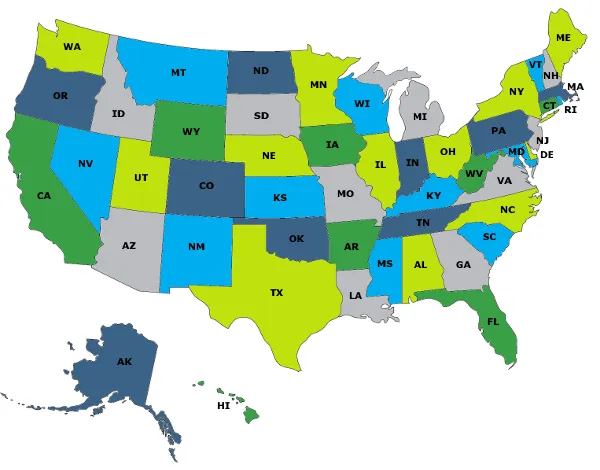A Guide for International Companies Processing Data of US Citizens
Introduction
As data breaches continue to pose significant risks to individuals’ privacy and security, US state data breach laws have become increasingly stringent to protect citizens’ personal information. For international companies handling data of US citizens, understanding and complying with these diverse and evolving state laws is crucial. Establishing a well-prepared data breach reporting process is essential to respond promptly and appropriately in the event of a data breach. In this article, we will guide international companies on how to prepare a data breach reporting process to align with US state data breach laws effectively.
As of June 2023, all 50 U.S. states, the District of Columbia, Puerto Rico, the Virgin Islands, Guam, and certain other U.S. territories have data breach reporting requirements in place. These requirements vary from state to state and typically mandate that businesses and organizations notify affected individuals and appropriate government agencies if a data breach compromises the security of personal information. The specifics of these requirements, including the definition of a data breach, the timeline for reporting, and the information to be included in the notification, can differ among the different states’ laws. Therefore, it is essential for businesses and organizations to be aware of the data breach reporting requirements in each state where they operate or process personal information. For the most up-to-date and detailed information on data breach reporting requirements, it is best to consult legal resources or governmental websites for each individual state.
Preparation
-
Stay Informed on State Data Breach Laws
The first step for international companies is to thoroughly research and understand the data breach reporting requirements of each US state where they process data from citizens. As state laws vary, it is essential to be aware of the specific definitions of a data breach, the timeline for reporting, and the required content of breach notifications in each jurisdiction. Its important to have data on the number of data subjects/customers you have per US state.
-
Appoint a Data Protection Officer (DPO)
Having a designated Data Protection Officer responsible for overseeing data breach incidents is beneficial. The DPO can ensure that the company stays informed about relevant data breach laws, coordinate the response to any incidents, and act as a point of contact with regulatory authorities and affected individuals.
-
Develop a Comprehensive Data Breach Response Plan
International companies should create a detailed data breach response plan tailored to the requirements of each US state. The plan should include clear procedures for detecting, assessing, and responding to potential data breaches. It should also outline the roles and responsibilities of key personnel during the incident response.
-
Identify and Secure Personal Data
Understand what types of personal data of US citizens your company collects, stores, and processes. Implement strong data security measures to protect this information, ensuring that it is encrypted, access-controlled, and monitored regularly for unauthorized activities.
-
Establish Communication Channels
Effective communication is critical during a data breach incident. International companies should establish communication channels to keep relevant stakeholders informed throughout the incident response process. This includes notifying affected individuals, cooperating with state authorities, and collaborating with third-party vendors, if necessary.
-
Conduct Data Breach Drills and Training
Regularly conduct data breach drills and simulations to test the effectiveness of the data breach reporting process. These exercises help identify weaknesses in the response plan and provide an opportunity to train employees on their roles and responsibilities during a data breach incident.
-
Prepare Standardized Breach Notification Templates
To ensure compliance with state laws and timely reporting, international companies should prepare standardized breach notification templates for each jurisdiction. These templates can be customized quickly and efficiently to meet the specific requirements of each state law. Prepare a list of State District Attorney office breach contact details.
-
Monitor and Update the Reporting Process
Data breach laws and regulations are subject to change, so it is essential to continuously monitor updates and amendments in US state laws. Regularly review and update the data breach reporting process to remain in line with the latest requirements.
Conclusion
For international companies processing the data of US citizens, navigating the complex landscape of US state data breach laws is critical. By preparing a well-structured and comprehensive data breach reporting process, these companies can ensure timely and effective responses to potential incidents while complying with diverse state requirements. Understanding the unique aspects of each state law, staying vigilant for changes, and implementing proactive security measures will empower international companies to safeguard the personal information of US citizens and protect their reputation in an increasingly data-conscious world.

